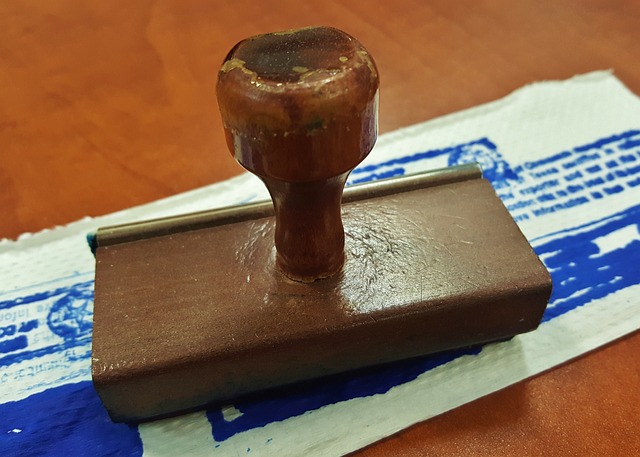When dealing with the UK Home Office for visa applications or immigration matters, it is essential to submit notarised document translations. The Home Office requires precise and authenticated translations for any documents not originally in English or Welsh to maintain legal integrity and compliance. In the UK, notarised translation services UK are crucial for providing translations with legal weight equal to the original texts. These services involve certified translators converting the document into English, followed by a notary public attesting to the accuracy of the translated content. The notary's stamp is essential as it confirms the translator's expertise and the translation's fidelity to the source material. Applicants should use professional and reliable notarised translation services UK to avoid delays or rejections due to unauthenticated documents. It is imperative to select translators with expertise in legal translations, proficient in both the source and target languages, and knowledgeable about immigration, visa, and Home Office terminologies to fulfill all necessary legal obligations for staying in the UK. This ensures a smoother application process by meeting the exacting standards of the Home Office and upholding the integrity of official communications within the UK's immigration framework.
When interacting with the UK Home Office, presenting documents that are accurately translated and notarised is paramount. This article elucidates the critical role of notarised document translations within UK Home Office applications. It delves into the necessity of these services, outlines the steps to procure them, and emphasizes key considerations for choosing a reputable provider. With a focus on notarised translation services UK, this guide aims to demystify the legal requirements and ensure your documents are both accurate and accepted, facilitating a smoother process for your Home Office dealings.
- Understanding the Necessity of Notarised Document Translations for UK Home Office Applications
- The Role of Certified Translation Providers in the UK Home Office Process
- Steps to Obtain Notarised Translation Services in the UK for Home Office Submissions
- Key Considerations When Selecting a Notarisation and Translation Service Provider in the UK
- Navigating the Legal Requirements: What Makes a Translation Notarised and Legally Acceptable by the UK Home Office?
Understanding the Necessity of Notarised Document Translations for UK Home Office Applications

When engaging with the UK Home Office, submitting notarised document translations is a critical aspect of many applications. The necessity for such precise and authenticated translations arises from the Home Office’s stringent requirements for official documents presented in languages other than English or Welsh. Notarised translation services UK play a pivotal role in ensuring that translated documents carry the same legal weight as their originals. These translations are not just a matter of linguistic accuracy but also a question of legal compliance and integrity. The process involves a qualified translator rendering the document into English, with the translation then being certified by a professional notary public as true and accurate to the original text. This certification is essential, as it confirms the translator’s qualifications and the notary’s verification of the translated content, thereby satisfying the UK Home Office’s demands for authenticity and trustworthiness in documentation. Prospective applicants should engage with reputable notarised translation services UK to avoid delays or rejections in their application process due to document discrepancies or lack of authentication. It is imperative to choose translators who are adept at handling legal documents, as they must possess a comprehensive understanding of both the source and target languages, as well as the specific terminologies relevant to immigration, visas, and other UK Home Office matters. This not only streamlines the application process but also ensures that applicants meet all necessary legal requirements for their stay or visit in the UK.
The Role of Certified Translation Providers in the UK Home Office Process

When individuals or organisations require notarised translation services in the UK for submission to the Home Office, the role of certified translation providers becomes paramount. These providers are instrumental in ensuring that all foreign-language documents are accurately and precisely translated into English, adhering to the stringent standards set by the UK Home Office. The process involves translators who not only possess linguistic expertise but are also familiar with legal terminology and documentation requirements. This dual proficiency is crucial for translations to be accepted by governmental bodies such as the Home Office, which demands both legal compliance and linguistic precision. The certified translation must accompany a notarised statement confirming the accuracy of the translation, thus bridging the gap between non-English documents and the UK’s official language requirements. This rigorous process ensures that the translations are reliable and trustworthy, facilitating smooth interactions with the Home Office for immigration purposes, visa applications, and other official matters. Engaging professional notarised translation services UK is a critical step in navigating the legal and bureaucratic landscape of the UK’s immigration procedures.
Steps to Obtain Notarised Translation Services in the UK for Home Office Submissions

When engaging with the UK Home Office, documents written in languages other than English must be accurately translated and notarised to ensure they are accepted. The process of obtaining notarised translation services in the UK for Home Office submissions involves several critical steps. Firstly, one should identify a reputable translation agency or a certified translator within the UK accredited by the relevant professional body, such as the Institute of Translation and Interpreting (ITI) or the Chartered Institute of Linguists (CIOL). These professionals are well-versed in the specific requirements of the Home Office and can provide notarised translations that comply with legal standards.
Once a qualified translator is selected, the original documents must be provided to them for translation. It is imperative that both the original and translated versions are identical in content to avoid any discrepancies. After the translation is complete, the translator will then notarise the document. This involves having the translation certified as true and accurate by a Notary Public in the UK. The notary will verify the identity of the translator and the accuracy of the translated content before affixing their official seal or stamp to the document. This certification is crucial, as it attests to the authenticity of both the translation and the translator’s expertise. Upon completion, the notarised translation can be submitted to the Home Office with the utmost confidence that it will meet their rigorous standards for acceptance. It is advisable to allow ample time for this process, considering the potential for delays, especially if additional verification or documentation is required. Opting for a professional and reliable notarised translation service in the UK is essential for a smooth and successful application with the Home Office.
Key Considerations When Selecting a Notarisation and Translation Service Provider in the UK

When engaging with a notarisation and translation service provider in the UK for official documents intended for use with the Home Office, several key considerations are paramount to ensure the integrity and acceptance of your translated documents. Firstly, it is crucial to verify that the service provider is officially recognised by the UK Home Office. This recognition signifies that the translator’s credentials and the translation process comply with the Home Office’s stringent requirements for notarised translation services UK. Additionally, the service should offer translations in a wide array of languages, ensuring that language barriers do not hinder your application process.
Furthermore, the chosen provider must have a team of professional translators who are native speakers of the target language and experts in legal terminology relevant to immigration matters. This expertise is essential to avoid any misunderstandings or mistranslations that could lead to delays or denials in your Home Office application. The service provider should also provide a certificate of accuracy alongside the notarised translation, which attests to the document’s authenticity and verifies that it is a true and accurate representation of the original text. Lastly, ensure that the provider offers secure and confidential handling of your personal information throughout the translation process, adhering to data protection laws in the UK. With these considerations in mind, you can select a reliable notarisation and translation service provider that will facilitate a smooth submission to the UK Home Office.
Navigating the Legal Requirements: What Makes a Translation Notarised and Legally Acceptable by the UK Home Office?

When engaging with the UK Home Office and requiring documentation in a language other than English, it is imperative to secure notarised translation services UK that adhere to stringent legal standards. A notarised translation is one that has been certified by a qualified translator before a notary public, confirming the accuracy and completeness of the translated content. This process ensures that the translation is a true and faithful representation of the original document, which is crucial for official purposes. The notary’s verification adds an additional layer of authenticity to the translation, making it legally acceptable by the UK Home Office. It is essential to engage with professional notarised translation services UK that are well-versed in the specific requirements set forth by the Home Office. These professionals will not only translate the text but also provide a statement affirming their competence as translators and attesting to the exactness of their work. This certificate of accuracy, combined with the notary’s seal, gives UK Home Office officials confidence in the translated documents’ reliability, facilitating smoother processing of applications that necessitate foreign language records.
When engaging with the UK Home Office, presenting documents that are not only accurately translated but also properly notarised is a critical aspect of the application process. This article has delineated the importance of notarised document translations and highlighted the pivotal role of certified translation providers in ensuring legal compliance. Prospective applicants must meticulously follow the outlined steps to procure these services within the UK, paying close attention to the key considerations when selecting a provider. By adhering to the legal requirements and utilizing reputable notarised translation services UK, individuals can expedite their applications and navigate this complex process with greater assurance of success. It is advisable to engage professionals who specialize in this field to avoid any potential issues with document validation.
